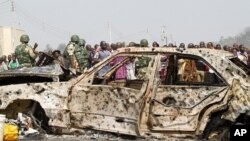While violence involving Boko Haram extremists occurs on an almost daily basis in northern Nigeria, a debate is taking place in the United States over whether the radicals should be labeled as a foreign terrorist organization.
The U.S. State Department currently designates 49 extremist groups as foreign terrorist organizations. Only one of those groups comes from sub-Saharan Africa, Somalia's al-Shabab extremists.
Peter Lewis is the director of the African Studies program at The Johns Hopkins University in Washington. He calls Boko Haram a violent insurgency, but says it would be a mistake for the State Department to add it to the list of terror groups. "We are short on facts other than the undisputed fact that Boko Haram has become a deadly insurgency, not just a security problem, or a challenge, but an organized, capable insurgency in northern Nigeria," he said.
Lewis says very little is known about the group's leadership structure or possible external ties. He says much more is understood about the context of poverty, corruption, poor governance and religious rivalries within which Boko Haram operates.
"Boko Haram, while it is a small movement, while it is essentially a sect that has a claim on the loyalties and ideas of only a tiny minority of northern Nigerians, nonetheless taps into a broader sense of resentment, of anger, a sense of marginality and a broader catchment and demographic of alienated, unemployed, poorly educated northern youth," he said.
Lewis says alleged Boko Haram spokespeople may even have ties to the Nigerian government and pretend they have links with regional terrorist groups to attract more attention and outside funding in the effort to stop the insurgency.
One analyst in favor of the terror label is former U.S. ambassador to Nigeria, Howard Jeter. He disagreed with Lewis at a recent Washington conference. "It is really a terrorist group. And Peter said let us not designate it [as such]. I would like to hear your explanation as to why. It is a terrorist group. If you kill 28 innocent people worshipping in a church, it is a terrorist group," he said.
Jeter was referring to bombings during Christmas holiday church services last year on the outskirts of the capital, Abuja.
Other Boko Haram attacks have targeted security forces and Muslims. Leaders who have come forward in the media have said they want to impose Islamic Sharia law. The name Boko Haram, which means "Western education is a sin," was initially given by critics of the radicals as a way to make fun of them.
Jean Herskovits, a professor of history at the State University of New York, recently wrote about Boko Haram in an opinion article in The New York Times. Herskovits said that if the United States placed the group on the foreign terror list, it would make more Nigerians fear and distrust America. She also said such a decision could turn the U.S. government into an enemy of many of northern Nigeria's Muslims. Herskovits says pressure is growing from some lawmakers and U.S. government agencies to label Boko Haram as a terrorist group.
John Campbell, from the New York-based Council on Foreign Relations, says U.S.-Nigerian ties are extremely important, and that these debates should not be taken lightly. "We face the challenge of developing a policy response to Nigerian developments that reconciles our strategic interests with our abiding goal of promoting democracy and sustainable development in the giant of Africa," he said.
Last year, U.S. lawmakers from the House Committee on Homeland Security also proposed that Boko Haram be added to the list of designated foreign terror groups, but so far officials from the State Department's Africa bureau have disagreed, and the northern Nigerian radicals have remained off the list.
On its website, the State Department says the designation plays a critical role in the U.S. fight against terrorism and is an effective means to curtail support for terrorist activities and for pressuring groups to get out of the terror business.
Terror Label for Boko Haram Debated




